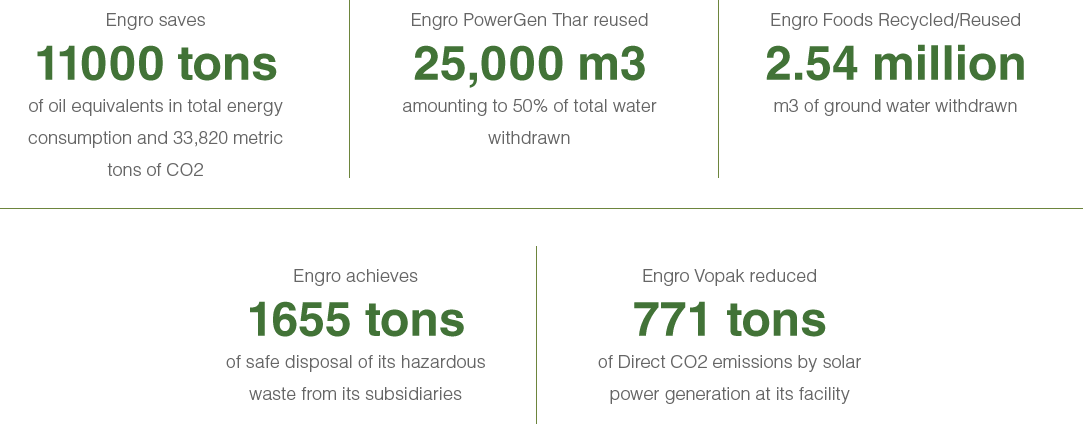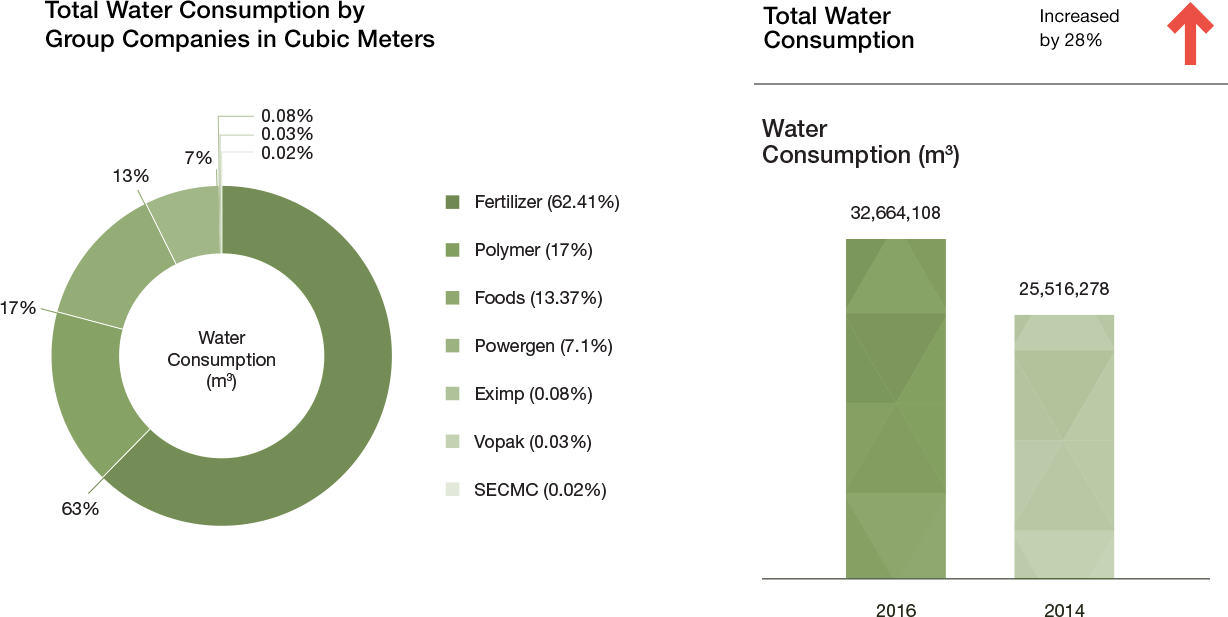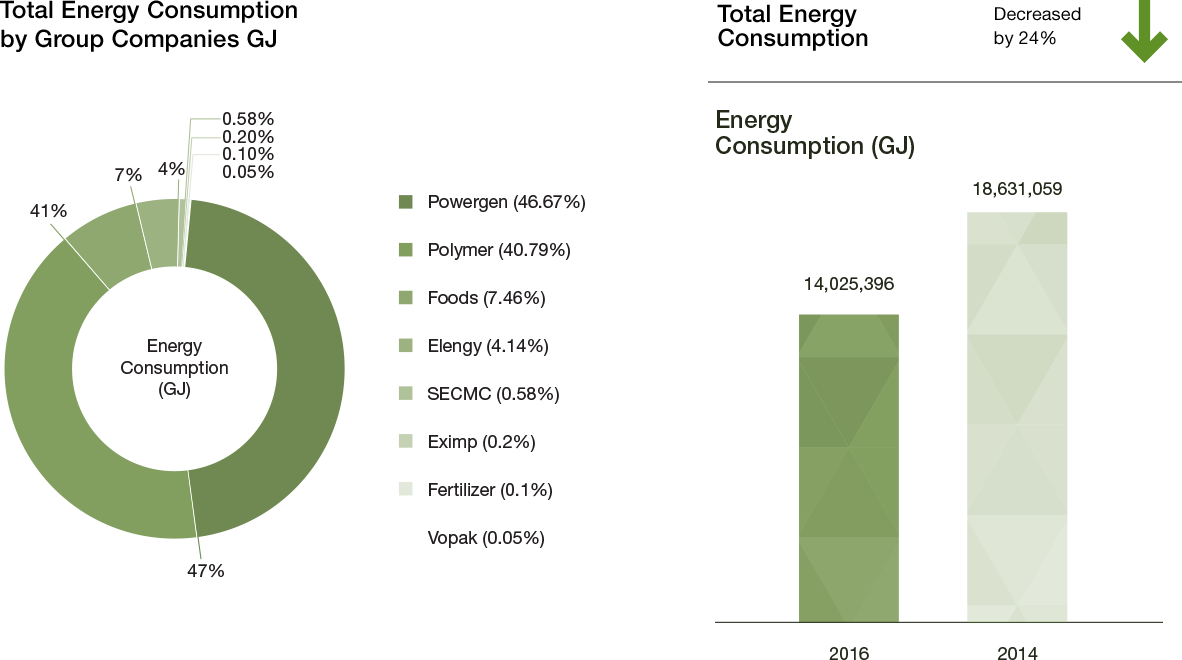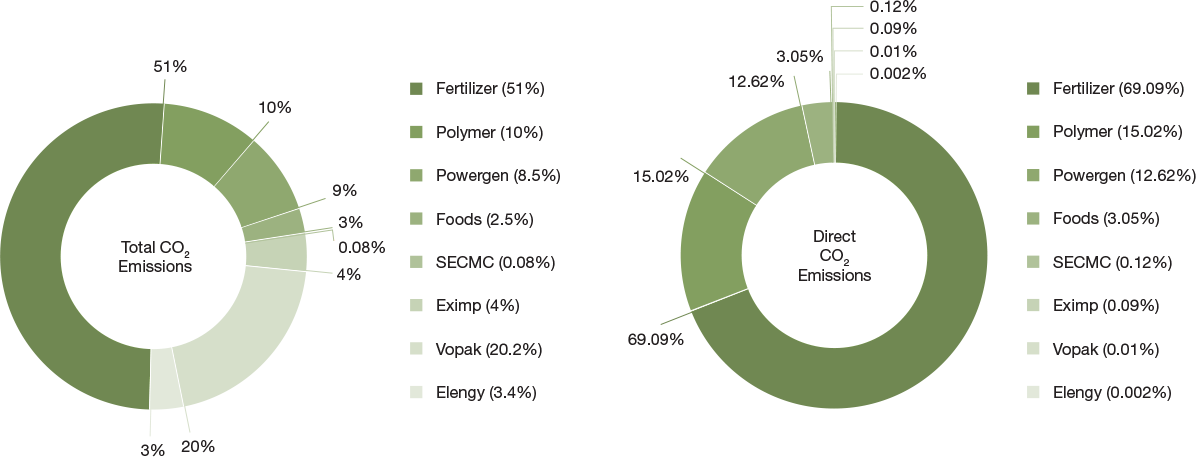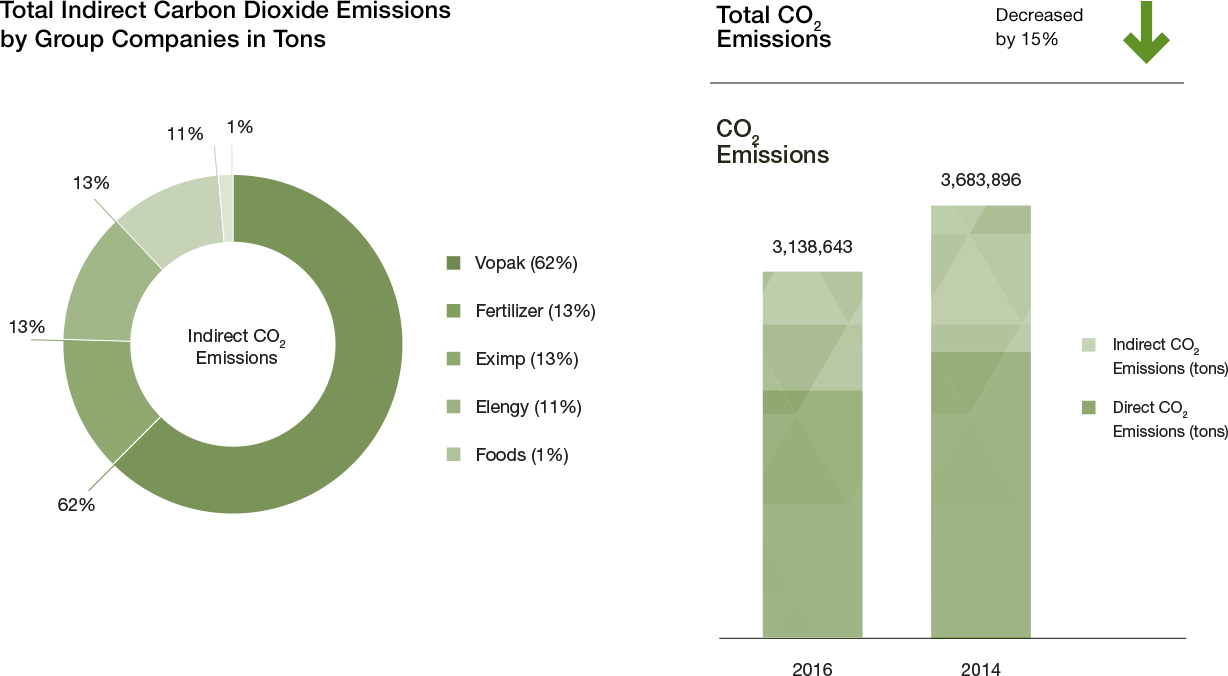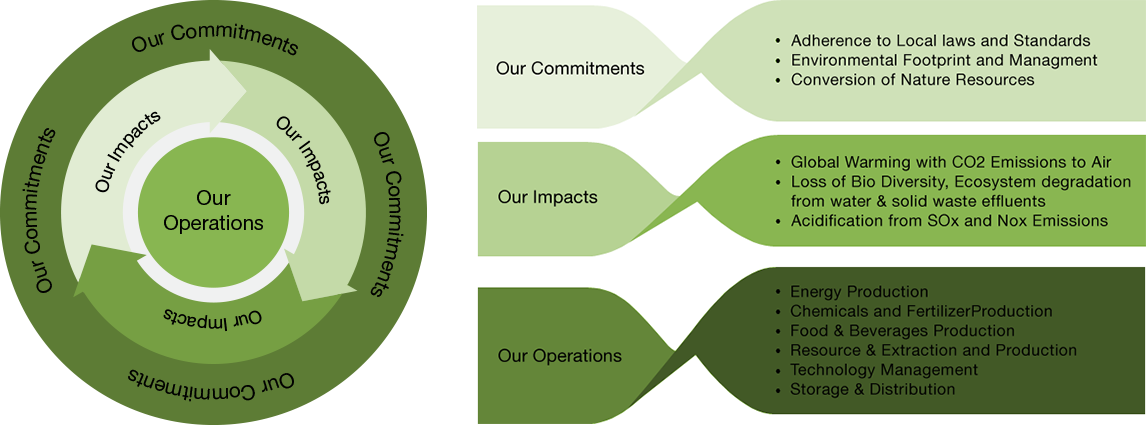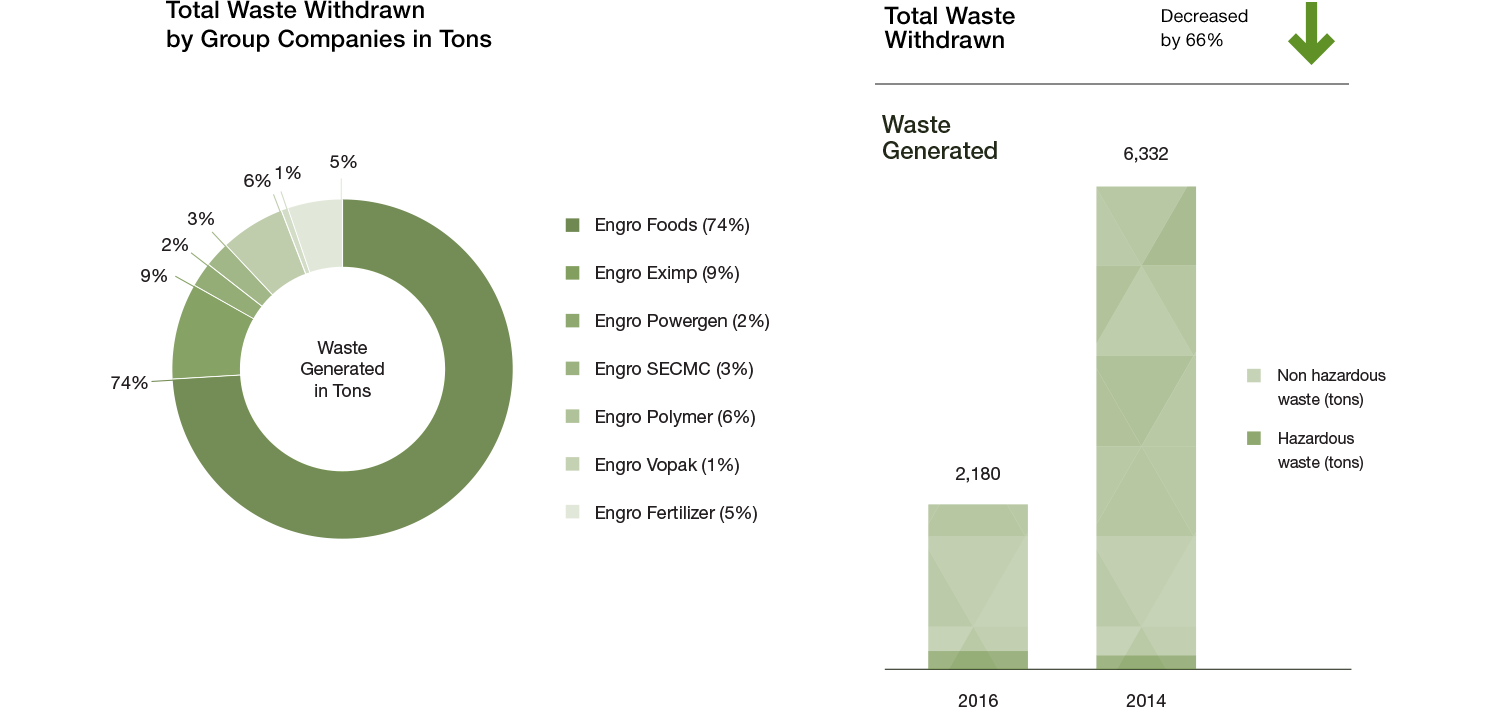Engro aspires to be a leader in moving the needle of its operating environment from mere reactive compliance to proactive environmental stewardship. Over the years we have evolved to preserving the environment we operate in as an active part of our organizational culture. Our commitment towards ensuring our natural capital objectives is driven by top management and enshrined in our corporate governance framework, and is then followed by our subsidiaries. Engro Corporation and its subsidiaries take great care to define and designate priority areas responsibly within their own operating environment. We redesign, refine and assign aggressive targets for successful management of environmental effluents and resource conservation. We treat ecosystem management and responsible resource utilization as our own natural capital and continuously strive for its betterment. Standardization for us is the key to success in this respect. All our businesses are certified in environmental management systems EMS 14001. We also maintain a rigorous internal audit regime with a prime focus on continuous learning and improvement across the spectrum from behavioral to technical interfaces
our journey compliance to capital
At Engro our approach towards natural capital management has always been that of a responsible stakeholder while delivering excellence in production operations since our inception. Our journey towards valuing our Natural Capital started from 1991 as part of the legacy we inherited from EXXON Chemicals, after formally transforming to Engro Chemicals Ltd. By that time Engro had already developed self-monitoring environmental metrics. This was not binding on us by any local law, rather it was our own initiative to commit to at least monitoring our emissions and keeping them within a certain bench mark.In 1997 with the passing of Pakistan Environmental Protection Act (PEPA) and induction of National Environmental Quality Standards (NEQS) we became one of the first commercial chemical manufacturing facility in one of the remote geographical locations of Pakistan to follow the mandatory standards in letter and spirit. We adapted our organization’s working culture accordingly by developing an organization and corresponding management structure with stringent training and staffing regimes. We had already started categorizing and managing our hazardous wastes with our own set of
disposal standards. In 2003 Hazardous Substance Rules were promulgated by the government of Pakistan. Once again Engro became a leader with amicably trained human and physical resources to cater to the ever changing needs of the regulatory frame work adopting the ISO 14001 Environmental Management Framework in 2004 one of the pioneers in this standardization in Pakistan. In 2005 Engro took another leap forward by becoming a signatory to the charter of United Nations Global Compact (UNGC) and became the first company in Pakistan to officially disclose its environmental performance by adopting to the disclosure requirements of Global Reporting Initiative (GRI) and followed the GRI frame work till 2013. As part of Engro Corporation we adopted the integrated reporting model keeping in view the diversification of our businesses and became the first corporate entity to publish Integrated Report merging our environmental performance to resource efficiency and valuing it formally as our Natural Capital. This journey of constant dedication and responsibility still continues
our strategy - valuing our natural capital
At Engro, we have a three layered approach to our strategy towards valuing our natural capital, at the core is our operations. We at Engro have a firm belief that responsible operations will always result in sustained and improved environmental outcomes. Keeping in view of the multitude of challenges that we face due to our operations predominantly in the Chemicals, Polymer, Energy and food businesses we always reflect upon the intended environmental impacts and risks associated to the external and internal environment. We also take great care that we monitor and reduce our negative impacts and bring sustained improvement in our positive impacts with an active commitment and governance structure at each tier of governance and management, this includes a structured approach on adherence to all local laws and applicable standards, classification and regular appraisal of our environmental foot prints, and also to continuously strive towards conservation of natural resources through efficient technology and behavioral change.
emerald of the desert green thar concept
Sindh Engro Coal Mining Company (SECMC) takes pride in its commitment to retain and improve the positivity of its environmental footprint in the desert of Thar. The “Green Thar Concept” has evolved as a corner stone of this commitment. In this regard a carefully defined and designed ‘Ansari Green Park initiative’ boasts as a perfect launching pad as part of our efforts to sustain and promote this concept. A state of the art, park envisions to promote greenery in the desert conditions of Thar in general and our area of operations in particular through extensive plantation of adaptable species of trees and plants and convert barren land into fertile green land. The key take away is to protect the local environment and preserve local ecosystems and bio diversity. In the first phase SECMC has managed to plant more than 30,000 saplings of different indigenous and exotic species of trees in the Green Park and its adjoining vicinity. These tree saplings include Neem, Babur, Kandi, Berri etc. over an estimated area of over 24 Acres of land with dry arid desert conditions. SECMC believes in that local trees can easily survive in this environment if properly managed. To meet the requirement of tree plantation, in-house nursery is developed with number of local species. For the first time in Pakistan SECMC has introduced Jatropha plants to the Thar environment. Jatropha is classified to be high carbon capturing specie. A single tree has a lifespan up to 30 years and a mature plant can absorb up to 8kg of Carbon Dioxide per year and can survive in desert conditions with minimum water footprint. A sample size of 200 has been planted as of now on trial basis. Plantation is carried out through dignitaries, locals, management, and students from different schools to make the community participate and arouse interest and awareness among young generation of the local community on the importance of positive impacts of the environment.
24 Acres
of desert rehabilitated with local and exotic tree and plant species
30,000
Healthy saplings planted
Art Nursery
to facilitate and develop healthy saplings
Jathropa Species
introduced for the first time in Pakistani desert
rehabilitating the costal ecosystems mangrove rehabilitation project
It is an irrefutable fact that the coastal eco system of Pakistan has borne the brunt of environmental Impacts of rapid industrialization in the coastal belt, population growth, coastal pollution and lack of fresh water. The Mangroves ecosystem degradation in the Indus delta is one of its prime example. This situation is exacerbated by a general lack of education and awareness of the mangrove ecosystems value, on the part of communities, policy makers and implementers. The Indus Delta is believed to have had as many as eight species, most of which are now extinct in Pakistan.
Since its inception in to the Engro Family, Engro Elengy Terminal Lmited (EETL) has been activly participating to contribute to the cause of re invigorating natural eco systems at Port Qasim Authority (PQA). It has deligently persued a state of the art project contracted to the International Union for Conservation of Nature (IUCN) as implementors to Rehabilitate over 500 Hecters of mangrove forests and its associated habitats.
Under the project mangroves plantations and nursery was established to improve the ecological conditions in the Phitti creek system of Indus Delta. The primary focus of this project is establish the best of its class mangrove nursery, replanting of mangroves on the denuded mudflats and propagation of mangroves species such as Rhizophora, Mucronata and Ceriops Tagal that are now unfortunatley extinct due to human activities the project is also designed to connect with local community, its mobilization an active participation towards activities to achieve improved local environment and management of the natural resources with corresponding social and economic benefits. The project has attained remakrable success with successful sprouting plantation taking place on 500 Hecters of successful sprouting. The initial assessments have shown positive natural habitat restoration with encouraginig numbers of marine life re population this included crabs and mud flappers as most generic.
Over 500
Hectors of coast line witnessed successful sprouting
500,000
of healthy saplings planted
100,000
sapling in nursery as container plants saplings
our measured natural capital performance
In view of the changing circumstances we have opted to benchmark our natural capital performance for 2016 with the base year of 2014. In the Year ended 2016, our contribution towards reducing our environmental foot prints and creating additional value in responsible use of resources is well on course. The performance of our key focus areas for resource efficiency i.e. Energy, Water and Material Waste for all subsidiary companies remained at par with the management expectations through most part of the year but more needs to be achieved. Energy represents the core driver of our business operations. We at Engro believe energy security to be the basis of Pakistan’s Industrial growth and economic wellbeing. There is unanimity of opinion within our stake holders that operating energy intensive industries does not make us oblivious to its over stretching and rigorous and comprehensive efforts should be made to reduce our total energy footprint. Our total energy consumption recorded a 24% decrease or 4.6 million GJ, compared to 18.631 million GJ in 2014, this for us has been a single major achievement in respect of the total valuation of our natural capital as saving 11000 Tons in Oil Equivalent.
Energy Intensive operations mean our water foot print also needs due consideration in year ended 2016 our total water consumption peaked at 32.6 million m3 as compared to 25.5 million m3 of water in 2014 an estimated increase of 28 %. The summers of 2016 were hot and dry, keeping that in perspective and our businesses geographical locations compiled with excessive evaporation, cooling and equipment breakdowns it was an expected outcome however we need to consider this as a starting point to rethink and redesign our working methodologies with associated technology upgrades. We reduced the waste generated from 6,332 Tons in 2014 to 2,180 Tons in 2016 an estimated 65 % decrease. A major portion of this decrease is attributed to the corresponding decrease in production of Engro EXIMP that was one of the major non-hazardous waste contributors in 2014. This year we also made good progress in reducing our Carbon dioxide (CO2) footprint. Our indirect emissions decreased by 213,923 Tons and our direct emissions decreased by 331,330 Tons with a total reduction of 545,253 Tons of CO2 that gives a total decrease of 15 % approximately in 2016 as compared to 2014
